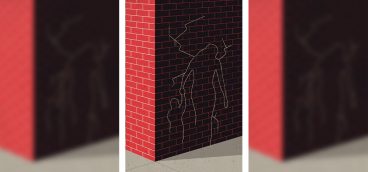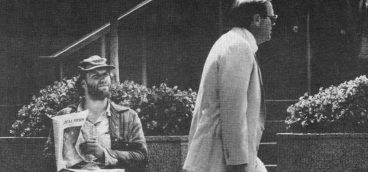The Death of a Homeless Man

Last week, I got the news that I knew one day would come. Joe Regoli had died.
Back in 1988, I wrote a series about Pittsburgh’s homeless, based on my living on the streets for 14 days and nights, undercover, with long hair and a beard. I was 26, and the Pittsburgh Press series changed my journalistic trajectory, won national writing awards, and later became part of the landmark Supreme Court media law case—Food Lion v. ABC News.
(View full “I Am Homeless” series here.)
The attention started immediately and was intense for me at that age. The newspaper literally sold out and had an extended press run, and I appeared on every local TV and radio station. I remember one, in particular, the KDKA TV morning show. The late Jean Stapleton (Edith Bunker in “All in the Family”) was to be the main guest, but the public reaction to my series bumped her to an earlier spot in the show, and I sat on a stage in front of a live studio audience discussing my series. A 10-year-old boy asked, “What can we do to help the homeless?”
Suddenly the expert of the hour, I paused and said, “Well, I guess we can give them a home.”
The next day, the lobby security guard called to say that a homeless guy wanted to speak with me. So I went down. Waiting outside was a guy holding two plastic bags in each hand. He was 6’2”, big-boned, with a beard and long, reddish hair in matted dreadlocks. He had a flip-flop on one foot and a leather shoe on the other. His clothes were too heavy for that warm day, and he emitted the sweaty, stale homeless odor I’d had just a month earlier.
His name was Joe Regoli, and he shook my hand—a big hand with rough, cracked skin, and as we walked around the corner, at his request, to be in the shade, I saw for the first time the singular, shambling gate—part limp, part affectation—that in the years to come, I’d recognize from a distance.
Joe hadn’t been part of my series, and I soon realized that he was smart and likely saw in me an opportunity—of what I didn’t yet know. He read the papers, and it ultimately became clear that I was a possible media ally he might persuade to take on his crusades against conspiracies and injustice. In the coming days, we met several times, and mainly I listened to his stories about his complex problems, which he was always just one crucial step from solving. Joe was tediously longwinded, but as far as I could tell, not quite certifiably crazy. He was a kind of Don Quixote of the Pittsburgh homeless world.
As I listened, the words of that kid in the studio audience rang in my ears. I had gained tremendous acclaim for my series, and I felt a duty to see if I could somehow make a dent in the problem of homelessness. I was single, living on the third floor of a refurbished North Side row house. As I got to know Joe better, I asked myself: “Why shouldn’t I let Joe live there with me?”
As I got to know Joe better, I asked myself: “Why shouldn’t I let Joe live there with me?”
There was another fellow too, the most notorious homeless man in the city at the time. He was known by the nicknames “John the Baptist” and “Jungle Boy” because, regardless of the season, he wore only a loincloth. If the winter got particularly cold, he’d don a vinyl shawl over his torso. Before I started my project, Editor Angus McEachran told me to find out what this man’s story was. And so, this mysterious, long-haired figure became the Holy Grail of my weeks on the streets.
It was July 4th, and I was sitting in the shade of a thicket at Point State Park—where I had slept a few nights—awaiting the beginning of a free performance of The Pittsburgh Symphony Orchestra. Sitting in another thicket 20 feet away was “John the Baptist.”
After a careful effort over days, I got to know him. His name was Clay, he was about 5’8” and he had a Southern accent. He was an intelligent guy who, for some reason, had decided to eschew anything “artificial.” For him, that meant living in a little encampment along the Monongahela. Unlike Joe, who was gregarious, Clay was a loner to the extreme, and on a personal level, earning a degree of his trust, was a coup.
Clay and Joe knew each other, and about six weeks after my newspaper series ran, I suggested that they move into my apartment. Joe said yes immediately. He’d have a place where he could not only roost but, as I would soon learn, also store his assortment of junk. When it became obvious he was an unparalleled hoarder, I laid down some rules, which he very politely acknowledged but ignored. At the time, though, I was beginning to spend more time at the Squirrel Hill home of my soon-to-be wife. So what did I care? I had the space; why not let these guys live there?
Clay, however, took persuading. He would never take the step of committing to take a house key, and so he would sit on the stoop waiting for me to arrive home from work and let him in. When I was gone, Joe let Clay in, and the situation went on for a several months, deteriorating in terms of Joe’s radical hoarding—white garbage bags full of terribly important things that mustn’t be touched—and my slowly realizing that things were more complicated than I’d realized.
It all ended abruptly one day, when some college girls were moving into the first-floor apartment. I got home just as the girls and their parents arrived. Unfortunately, Clay was huddled on the stoop—a totally bizarre figure to anyone who didn’t know him—and all I remember was one of the girls’ fathers shouting “Absolutely not!”
With the loss of his renter, my landlord said my “guests” had to leave. Perhaps the experiment had failed for my lack of closer supervision. Perhaps it wasn’t meant to be. Either way, I regretted that my attempt to help had become another failure for them.
The last time I was in that apartment to clean it and move out, I got the full measure of Joe’s hoarding. Every cupboard was full of stale doughnuts, bowls of rancid butter and ancient, stacked slices of bread. I cleaned up, moved my furniture out, and wrapped my clothes that had remained there in a huge blanket and dropped it from the third-floor window onto the sidewalk below. (It was weeks before that bundle was allowed out of my girlfriend’s garage.)
Clay disappeared not long after. Someone said he decided to move back to the south. Joe, however, kept in touch, calling me at work every so often and apprising me of his continuous battles against conspiracies in local government, injustices in the legal system, and unfair practices at social service agencies. Joe loved doing this kind of battle. And I learned that he had actually succeeded in getting something called “The Regoli Rule” in effect in Pennsylvania legal doctrine. When he had appealed a 1984 defiant trespass conviction, the Superior Court ultimately ruled that a Common Pleas judge had to reach a decision and impose sentence in open court, and not the day after trial, as had been the case with Joe’s charge.
I knew Joe’s brother was a priest in Greensburg, but Joe refused to discuss his family, becoming agitated if I persisted. To Joe, his family became the dogs he found and adopted, and no doubt many readers will have seen him Downtown or in Oakland, carrying plastic bags with two German shepherds in tow.
For many years, he lived from house to house—in someone’s basement in the East End or an abandoned house in the Hill District. At one point, he was being booted from a house where the kind-hearted man’s wife finally cried “Enough!” I called Dr. Ken Thompson, a psychiatrist friend who has been a leading public health advocate for years. I asked if there wasn’t some place somewhere Joe could live. Surely, Joe must qualify for some kind of mental-health related program in Allegheny County. While he was bright, he was clearly paranoid and obsessive/compulsive to the extreme.
Ken said that, while there were such places, none would allow his dogs—a deal breaker. “I’m their Mama and their Papa—and they’re my family,” Joe said. “What would they do without me? And what would I do without them?”
“I’m their Mama and their Papa—and they’re my family,” Joe said. “What would they do without me? And what would I do without them?”
One day, Ken called with a solution. There was a farm out in the country where Joe could live, and they would take his dogs. Finally! It appeared that all the frustrating conversations would pay off. But when I told Joe, he declined. I persisted, saying it would be perfect. But for Joe, the vitality and life of the city, and making his rounds—independently—was his life.
As the years passed, I learned the lesson that helping someone isn’t as easy as it seems.
I would talk with Joe on the Boulevard of the Allies, or on a street corner in Oakland, or in the car when I gave him and his dogs a ride to wherever he was living. Our conversations followed a template. I’d pull over and ask Joe how he was doing. “Fine, fine, but I’m not important,” he’d say quickly, becoming exasperated if I followed my line of questioning. After cutting me off, he’d say something like: “First, and please—please!—remember this: Run your water for 15 minutes before you ever drink the water.” And so on…
The interminable, futile conversations invariably became frustrating to both of us—we had different views of what his problems were. But our talks always ended with well wishes and a handshake. Over the years, we had developed a friendship, and I think we both realized there was a gulf separating us that our good intentions, despite our efforts, couldn’t bridge.
Joe probably annoyed nearly everyone he knew well—certainly everyone who tried to help him. Why couldn’t he conform to the way the rest of us lived? Why couldn’t he simply be helped, become normal and let us feel the satisfaction of solving a problem and moving on?
He visited soup kitchens, and when they were going to throw away the food, he asked if he could give it to his dogs. When a staffer said no, Joe took it up the ladder, insisting that it was a waste and an injustice, that animals needed food too, and why couldn’t they see that? And he would persevere until they banned him for a week or a month.
He was particularly annoying to police. One older cop responded to a complaint about Joe but found no legal grounds to arrest him. Yet Joe’s incessant arguments were too much for the cop, who, to his credit, simply said: “I can’t take it any more! I have to walk away.” That’s the way Joe was.
It wasn’t always the way police were, however. Once Joe called me from a borrowed office phone somewhere. And though he always spoke on the phone in urgent, hushed whispers—concerned he was about to wear out his welcome or that people were eavesdropping on him—this time was different. He was going to be sent away to jail for several months on a minor charge. Could I take his dogs?
I said no (no way would my wife have agreed) but that I had a friend whose family had a farm, and maybe that would work. I gave my friend fair warning, and she still said yes, bless her heart. Six weeks later, she called to say things hadn’t worked out at the farm with the dogs, and could we find another solution fast? The dogs were being kept at the zoo, whose board she chaired, in a vacant bear exhibit space. And when I arrived, there they were, two mangy shepherds slinking around the faux rock landscape. A little kid pointed and said, “Mommy those are the strangest-looking bears I’ve ever seen.”
My best and last attempt to help Joe was about 12 years ago, when I was living with my wife and three kids in a big Squirrel Hill home we’d renovated. Joe called from another borrowed phone, whispering that he needed help. The police were after him again. Charges against Joe always were minor, and though he was big and looked and smelled like the homeless man he was, he was deeply religious in his own way. As unorthodox as he was, I assured my wife, he was also harmless, which was true. I persuaded her that we should help Joe.
It was an unusually warm December, and he and his dogs moved into the unheated carriage house in our back yard. A day after he arrived, I returned from work to learn that one of his dogs had been hit by a car on Negley Hill where we lived. Though the dog wasn’t badly hurt, I told Joe we would take him to the vet. Joe gave a variety of labyrinthine reasons why we couldn’t do this, and I finally threw up my arms.
Joe worked around the yard, and I paid him. He was strong and meticulous—too meticulous of course, but over the next few weeks, we developed a nice routine.
My kids all knew Joe and enjoyed his company. Once when my daughter was a sixth-grader on a field trip in Oakland, she stopped to talk with Joe, which freaked out her teachers. But she said it was okay. He was homeless Joe and was a friend of the family. The kids referred to him as “HLJ,” and years later he would appear in one of my sons’ college essays.
He was homeless Joe and was a friend of the family.
Joe and our housekeeper got along and had long talks. Things were going well. For his obvious quirks, Joe was a thoughtful person, and people generally liked him, except our neighbors, who wondered what we were doing to the neighborhood. And each night that December, either my wife or our housekeeper would prepare a big plate of food for Joe. He always thanked them profusely but never ate it, giving it to his dogs instead.
And so it went, until one evening, when the temperature was going to drop suddenly to just above zero. I told Joe he and his dogs had to come inside and stay in our basement. It was going to be too cold to stay in the carriage house that night.
He thanked me but refused. I insisted and he still refused, giving some litany of reasons. This went on for a few minutes, until I finally lost my temper—which is rare. I told him that I was not going to have a man, whom the police were allegedly seeking, being found as a frozen corpse the next morning in my carriage house. He would either come inside or leave that night.
Joe left.
I only saw him sporadically after that. Somehow after I moved to Fox Chapel, he got my unlisted telephone number.
I’d long since realized I’d never help Joe in the way I’d once conceived. But it was nice to hear from him—like an old friend—and we had our typical chat. We’d shoot the breeze briefly before he got into his issue. I’d listen to him ramble for 15 minutes, asking benign questions every so often, perhaps offering an idea, and then saying I had to go. And he would warn me to remember to be very careful about some important detail regarding life and living.
Sometimes when I saw him on the street, I’d pull over and we’d chat, or I’d give him a ride somewhere. Sometimes he was busy conversing with college students and would just smile, wave to me, and go back to his audience.
I hadn’t thought about Joe for a long time when, on Oct. 13, my wife and I met with a friend who is starting a charity through Operation Safety Net, which will provide homes for homeless people. The new program sounded great, and I told her in a few sentences about Joe, and how Ken Thompson and I had once lined up the perfect place for him and his dogs, etc. And it was that night that I heard from Ken for the first time in years, with the news that Joe had died.
Ken told me the circumstances. Joe was living in a house in Perry Hilltop that he had somehow come to own. I looked up Joe on the Internet and found a TV story from two years ago in which neighbors were complaining about Joe’s habits and that he was attracting rats. There was a 10-page Common Please Court opinion, which Joe had appealed as unconstitutional. And the Internet had photos of Joe’s ramshackle dwelling, with massive piles of junk everywhere and little hand-painted signs placed artistically on the front steps saying “No trespass” and “Keep out.”
Two weeks earlier, Joe hadn’t appeared at a food pantry he frequented. And when he didn’t appear again two weeks later, people went to his house and found him dead. I asked Ken about any dogs. None were there.
Joe was 69.
Over the years, when I thought of him, I sometimes remembered the great Robert Frost Poem “Death of the Hired Man.” I knew the day would come. Some day. And so it finally had.
“Sad,” my wife said.
“Yes, it is,” I answered. “But Joe lived the way he wanted to live. And he died in his own home and in the fall, when the weather has been so beautiful.”
That night, I wrote this story, and when I went to bed at 2 a.m., I said a prayer for Joe and lay there remembering him.
Once I gave Joe a pair of my shoes – sturdy, good sneakers that fit him well. And the next time I saw him, he was wearing plastic bags on his feet again. I guess he just liked them better.






